Sundance 2020 Interview with “The Assistant” Director Kitty Green
Written by: Christopher Llewellyn Reed | February 11th, 2020
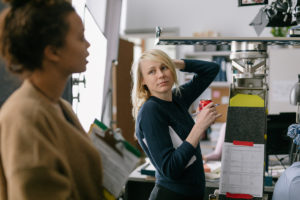
Credit: Ty Johnson/Bleecker Street
Just a week after the 2020 Sundance Film Festival ended, I had the opportunity to speak with director Kitty Green (Ukraine Is Not a Brothel), by phone, to discuss her narrative-feature debut, The Assistant, which played at the fest (and which I also reviewed). The film presents a day in the life of a lowly personal assistant in a production company run by a Harvey Weinstein-like monster. Starring Julia Garner (Grandma), it’s a haunting look at the humiliations and abuse that those without power face on a constant basis within patriarchal systems. Here is a condensed digest of our conversation, edited for length and clarity.
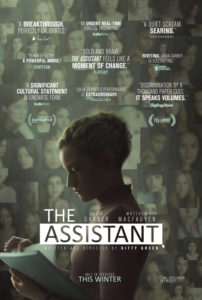
Christopher Llewellyn Reed:Prior to making The Assistant, you made two feature-length documentaries and a documentary short. The two features are Casting JonBenet and Ukraine Is Not a Brothel. What made you want to react to the Harvey Weinstein allegations in a narrative-fiction format rather than in another documentary?
Kitty Green: That’s interesting. I’m not sure I was ever a straight documentarian. At least JonBenet had a lot of recreations and it was almost a hybrid work, so it had a combination of fiction and nonfiction. It’s not that I’m interested in the form; I’m more interested in the subject. So, I start with an issue that I’m interested in and I care about, and then I just figure out what’s the best way to tell this story and what’s the best way to communicate what I’m trying to express. This film really looks at microaggressions and small details that are symbolic of a larger system that keeps women out of power. So glances, looks, gestures, all of those little moments became really important. And that’s something you can capture in fiction, I think, easier than you can in documentary. In documentary, you’re just trying to shoot what’s going on; you can’t really hone in on the details as much.
CLR: Speaking of these little gestures and the way that narrative fiction can do things differently than can documentary, I was wondering if you could talk about your choice to hold for so long on so many long takes, which becomes a definite strategy of your film. There are quite a lot of moments where you allow the actors, particularly Julia Garner, to just behave on camera. How did you develop hat strategy?
KG: I was interested in placing the audience in the shoes of the person with the least power at a very powerful production company. So, I really wanted them to go through her day as she would, task by task. When she does the photocopying, we’re right there with her; we follow her through all of the ups and downs of her day.Some of the tasks are a little provocative, I guess. She picks up an item of clothing off the couch that she finds, things like that that are a little suspicious, but it’s just another part of her day, you know what I mean? There are a lot of things she’s got to get done. So, she is only getting bits and pieces of information about her boss’s behavior, not everything.
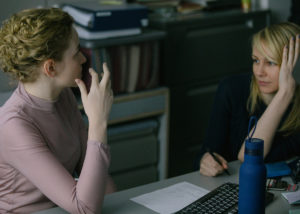
CLR: Speaking of the boss, did you ever consider revealing him? Because we never do see him, which is, I think, a great choice, but maybe at some point you thought differently? How did you land on never showing him?
KG: I never wanted to show him. I was always interested in making a film about women and why women aren’t in positions of power. And so I was looking at how come, rather than looking at it top down, from the boss down; I was looking at it from the person with the least power up. Why isn’t there a path for her in this industry? You know? I was aware that bad men have had enough screen time, and I didn’t want to make another movie about a bad guy. We know what’s going on behind his closed door. What’s more interesting to me is what’s on the other side of that door, the kind of machinery that surrounds a predator like that.
CLR: Speaking of your approach to the story, despite the really horrific nature of what’s going on in the background, your film is ultimately very quiet; it’s also very bleak, as it should be. And it ends without any particular resolution to the central issue. There’s nothing wrong with that, but did you ever consider a more dramatic arc to the story? I mean, Jane certainly changes, but it’s not clear what the future ramifications of that change will be. Did you ever think about approaching the story with a different ending?
KG: It’s set pre-#MeToo movement, so it’s set before we really had the language and the spaces to speak up about misconduct. So, in that sense, for a lot of people that were working in those positions at that time, it felt hopeless. It felt like there was no way out of a situation like that and there was no way to stop it. I definitely was trying to be authentic to what it was like to be in a position like that, then. If it was set today, perhaps it would have a different ending, because maybe there is somewhere she could have gone or some avenue for her, in terms of being able to voice her concerns.
CLR: Well, in regard to such an avenue, you of course do have this one moment where she comes forward and tries to speak with the HR representative, played by Matthew Macfadyen. How did you decide that that was going to be the scene where she does come forward and then it just goes nowhere?
KG: A lot of people I spoke to mentioned going to HR to report behavior and being quickly shut down by it. HR is there to protect the company, not the employees, and that’s something people learn pretty quickly. So I was trying to display that or show that.And then, I also wanted to include an example of gaslighting, which I think is very common in these workspaces. He rips her argument apart and pokes holes in it to the point where she doesn’t even know why she came in in the first place. So, that was important to me, too.
CLR: I really like Julia Garner and I like her in this film. I know her mostly from Ozarkand from the movie Grandma, and in both of those, though she’s always good at internalizing conflict, her performances are a little bigger than here, where, like the film, she is quite restrained. How did you cast her and how did you work with her?
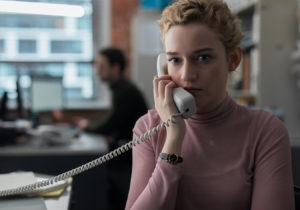
KG: I’d seen her on The Americans years ago and thought she was interesting. I was like, “Ooh, I like that kid. She’s got something.” I went to my casting agent and asked for somebody that audiences found interesting to watch, since there wasn’t going to be a lot of dialogue. So, I guess I was looking for someone with a striking look, and my casting agent recommended her. We sat down and had coffee and she seemed to really understand the script and get the character. I was pretty fortunate.
CLR: And what was your rehearsal process like working with her, especially because she’s on camera so much, speaking little and just behaving, and she has to do so much internally?
KG:We had quite a bit of rehearsal, which she wasn’t used to because she comes from television. So, it was fun to have a bit of time to play. We spoke to a lot of assistants together. Basically, it’s a film about work, so I was conscious of making sure she knew how to use all of the equipment and could use it well. We did a lot of technical rehearsals, in that sense. And then she went to her manager’s office and observed the assistants there. So there were a bunch of things we did to get ready. I mean, it was a very short shoot: it was only 18 days. We knew that once we started, we didn’t really have the time to be so thorough, so we tried to do so in pre-production.
CLR: And what about Matthew Macfadyen? How did you land on him and cast him as the unhelpful HR person?
KG:His name came up and we all got excited by it. I hadn’t seen Succession, but I knew him as Mr. Darcy and I thought he was an incredible actor, so definitely thought he could rise to the challenge. It was very, very exciting to have him involved.
CLR: Well, what’s nice is he has a sympathetic face and so you go in hoping for the best.
KG:He’s one of those actors that can turn on a dime, you know? And, yeah, he’s unassuming. There are a bunch of reasons why he’s wonderful in the role.
CLR: I also really like the look of your film. It has very low-key production design and muted colors. How did you work with your production designer, Fletcher Chancey, and cinematographer, Michael Latham?
KG: We had a lot of discussions about trying to keep it authentic and keep it feeling real and relatable, but also imbue it with tension, somehow. That claustrophobic atmosphere was important to us, and the fluorescent lights and the drab office feel was something we discussed again and again. So, it was just trying to make sure it felt tense, but also didn’t lean into horror tropes, you know? It was a difficult balance.
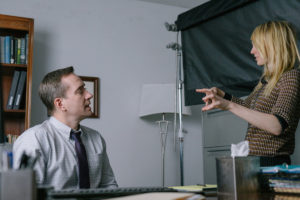
CLR: How much of that space was entirely created by your team and how much of it was an actual office, if at all?
KG: Oh, we hired an office space and we built a few walls inside, just to give me extra walls, but it was basically a functioning office that we were shooting inside of.
CLR: In your press notes, you talk about your nonprofit partnership with the New York Women’s Foundationon this film. Can you explain what that partnership is?
KG: We’ve partnered with the New York Women’s Foundation, who support a bunch of women-led organizations, including Tarana Burke’s Me Too, and have done so since very early in its inception, I think. I mean, I can sit here and talk about these issues and highlight them and that’s what the film does, it starts conversations about it, but there are people out there who are actually doing the work to make change. And so it’s great to be able to support them, as well.
CLR: Well, congratulations on the film. I hope lots of people see it and it has a powerful effect on the industry.
KG: Thank you so much.

